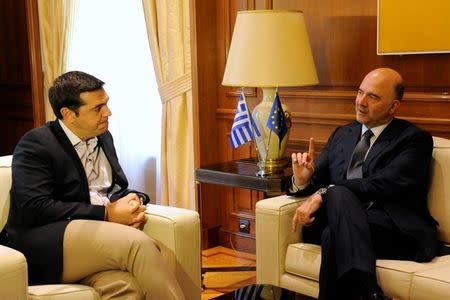Greece urges EU to cut surplus targets to boost competitiveness
By George Georgiopoulos and Francesco Guarascio ATHENS (Reuters) - Cutting budget surplus targets after 2018 would help Greece lower taxes and become more competitive, Finance Minister Euclid Tsakalotos said on Monday as he urged international lenders to conclude a vital bailout review and grant Athens debt relief. Tsakalotos told a conference that Greece's targets for its primary budget surplus - which excludes debt servicing costs - could be cut to 2.5 percent of national output beyond 2018 from 3.5 percent, a proposal that European lenders have rejected. "Some countries say that Greece's biggest issue is not its debt but competitiveness," Tsakalotos said, referring to comments by German Finance Minister Wolfgang Schaeuble last week. "If Greece's problem is competitiveness, I can't think of a better measure than reducing its surpluses. "My proposal is the following: Let's agree to lower the primary budget surplus target to 2.5 percent from 3.5 percent and the Greek government will ensure that the full one percentage point difference will be allocated to tax relief for small and medium-sized companies ... to boost competitiveness." ECB Executive Board member Benoit Coeure told delegates at the same conference that Athens must stick to the terms of its rescue programme to pass the review. After a meeting in Athens with Greek Prime Minister Alexis Tsipras, EU Commissioner for Economic Affairs Pierre Moscovici tweeted later on Monday: "Long discussion with Tsipras. Good progress made in the second review. Need to see staff level agreement ahead of Monday's Eurogroup!" Despite pre-election promises to end austerity, Tsipras signed up to a third bailout and more belt-tightening in July last year. Tsipras was later re-elected on promises to protect Greek pensions, wages and labour rights. SNAG IN TALKS Negotiations between Athens and its creditors hit a snag last week due to differences on fiscal targets, and energy and labour reforms that are part of Greece's second bailout review. A long-standing rift between the European Union and the International Monetary Fund on medium-term fiscal targets has also clouded Greek hopes for a swift conclusion of the review. Greece's negotiating stance on labour reforms is in line with its bailout, but the EU is making concessions to convince the IMF to stay on board, Tsakalotos said. The fund has yet to decide whether it will participate financially in the bailout. "Without concluding the second review there will not be a solution on debt and without this solution we won't be able to be included in quantitative easing," he said. "Without quantitative easing the Greek government won't be able to tap markets in late 2017, early 2018." Greece is excluded from the European Central Bank's programme of buying up sovereign debt of euro zone nations because it has not completed the review. Lenders have not decided whether its debt load is sustainable. ECB chief Mario Draghi said there were still concerns about the sustainability of Greece's public debt. Tsakalotos said there has been progress on short-term debt relief measures, expected to be the focus of talks among euro zone finance ministers - known as the Eurogroup - on Dec. 5. But Athens is also awaiting talks on medium- and long-term debt relief after that meeting, he said. Two Greek officials said an extraordinary Eurogroup meeting was likely before Christmas to sort out remaining differences with the IMF. One of the officials said he expected an initial agreement on reforms on Dec. 5, and a final deal with the IMF two weeks later on debt relief and fiscal targets beyond 2018. "The worst scenario would be a new delay," the official said, noting that with new elections looming in Germany next year, negotiations would get more complicated if no deal is reached before the end of 2016. (Additional reporting by Lefteris Papadimas, and Francesco Canepa in Frankfurt; Writing by Renee Maltezou; Editing by Mark Heinrich)



